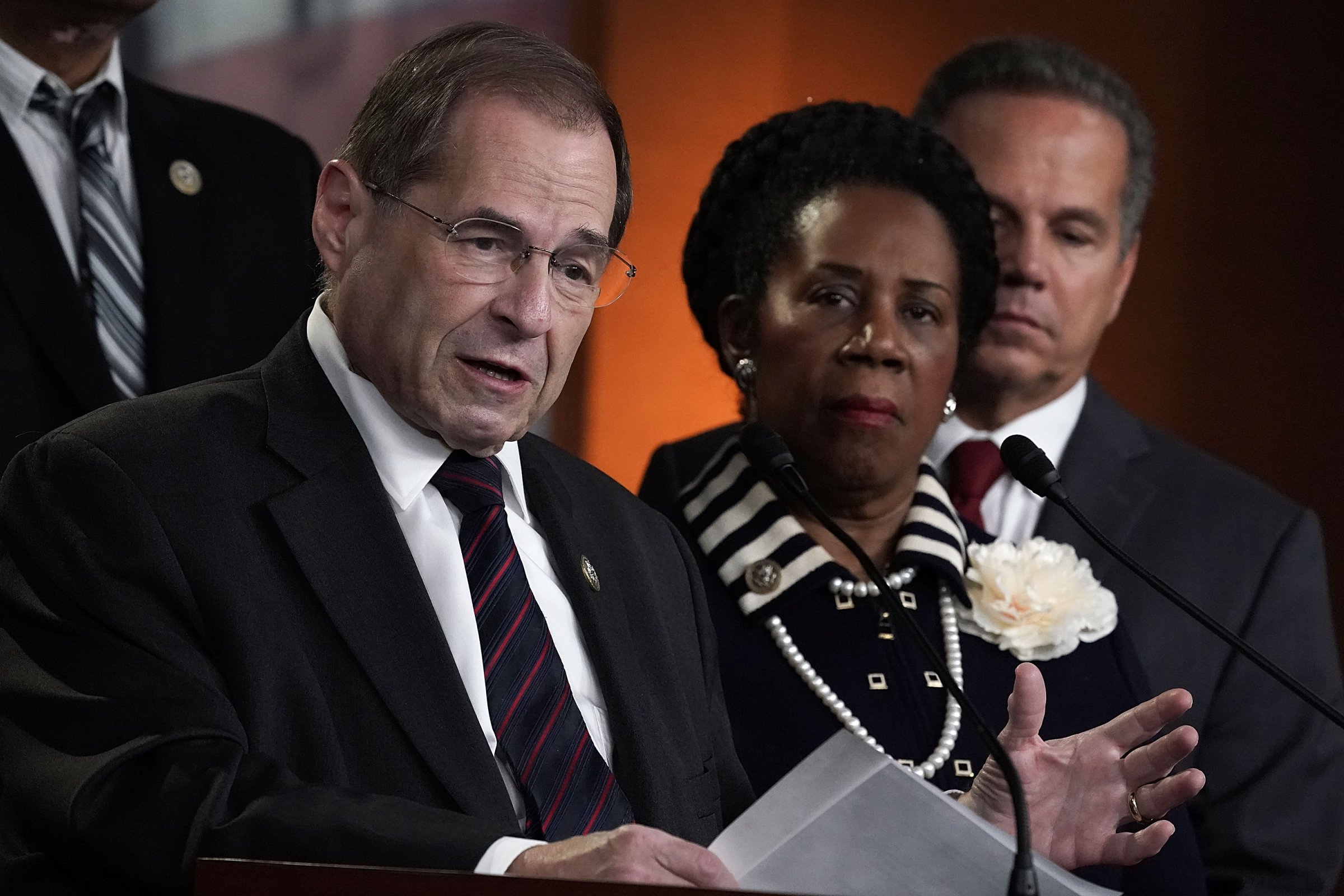
On one level, the divisions between the groups who convened at a New Jersey detention center this past Father’s Day could not have been more stark; seven of them were lawmakers in the U.S. House of Representatives — positions of both power and privilege — while the other five were immigrants who, facing imminent deportation proceedings, find themselves at the very hands of the government their fellow attendees are serving in.
The lawmakers — all Democrats who represent districts in New York and New Jersey: Reps. Jerrold Nadler, Adriano Espaillat, Hakeem Jeffries, Carolyn Maloney, Bill Pascrell, Frank Pallone and Albio Sires — could only imagine what these detainees, some of whom had recently had their children torn from them as a result of President Donald Trump’s zero tolerance policy, were going through. But, the representatives said they found common ground in their parenthood — and that drove the emotional conversation.
“At one point I wanted to cry when I was hearing some of this,” said Nadler, who arranged the meeting. “Its Father’s Day. You know that when this is over in an hour, you’re gonna go home to your family. And they’re gonna go back to a cell. And they don’t know where their kids are. And they’re being processed for deportation.”
“It’s evil,” Nadler said. “I have never said anything about the United States government being evil before. This is evil.”
No Congressional aides or attorneys were in the room; it was just the detainees, whose name have been withheld for security reasons, and the lawmakers — who were prohibited from using cell phones or electronics during the meeting, and relied on notes and their own recollections taken to relay the stories of these detainees to relay the meeting to TIME.
Sires and Espaillat translated for the men, most of which had voluntarily turned themselves in upon reaching the U.S.-Mexico border when they submitted their requests for asylum. Once everyone was situated, the men being held at the center began to tell the lawmakers their stories.
One came from Central America with his daughter, who was almost 5. Border Patrol officials had questioned whether she was really his daughter (he told the representatives he had her birth certificate and offered to take a paternity test). They were both sent to a detention facility, but authorities took the daughter in the middle of the night, and he doesn’t know where she is. He had heard she might be in Michigan, but is relying on rumors and word of mouth — nothing has been confirmed.
Another man in the facility, a fisherman, arrived with his 12-year-old daughter after his business partner was murdered by a gang. He thinks his daughter, who he told lawmakers clung to him as they were separated, causing authorities to literally tear them apart, could be in a New York detention center, but is not sure.
One other told the group how he fled drug violence in Central America with his 7-year-old brother, who was taken from him once they reached the border and he turned himself in to authorities.
In all three cases, according to the lawmakers, the men had been separated from their children — or sibling — because of the zero-tolerance policy implemented by the Trump administration in April. Under the policy, any person caught illegally crossing the border will be criminally prosecuted. As a result, adults who cross with children are separated from them once they are caught, and are placed under different government jurisdictions, which limits their communication and knowledge of each others whereabouts. (The U.S. Marshals Service handles the cases of the parents, and the Office of Refugee Resettlement, which is run by the Department of Health and Human Services, deals with the children). Although these men were seeking asylum from drug and gang violence, new restrictions implemented by the Department of Justice meant that, since they were crossing illegally, once they turned themselves in, they were separated from the children while they navigated their prosecution.
The lawmakers said the meeting, which lasted nearly an hour, mostly consisted of them listening to these stories. Jeffries recalled three separate occasions where they comforted the detainees, who became tearful and emotional recounting the separation.
Its unclear however, how much the lawmakers can actually do.
Pascrell said he sent a letter to Rep. Rodney Frelinghuysen, who chairs the House Appropriation Committee, requesting that nothing from the budget goes toward supporting Sessions’ policy, and asked ICE officials for reports on these individual cases.
Nadler introduced legislation on Tuesday, the Keep Families Together Act, that would prohibit DHS from tearing these families apart, and delay the prosecution process for immigrants seeking asylum. Sen. Dianne Feinstein introduced a similar bill in the Senate, which has garnered universal support from Democrats.
But Demcorats are the minority part in both chambers, and no Republicans have officially signed onto either bill. Even if they do, President Trump would still need to sign it into law, which seems unlikely given his current rhetoric on the subject; on Tuesday, he tweeted that illegal immigrants were “infesting” the country.
Still, Pascrell said they’re not giving up.
“They wanted to know basically, if we could help or not,” said Pascrell. “And we said we’re certainly gonna try.”
More Must-Reads from TIME
- Donald Trump Is TIME's 2024 Person of the Year
- Why We Chose Trump as Person of the Year
- Is Intermittent Fasting Good or Bad for You?
- The 100 Must-Read Books of 2024
- The 20 Best Christmas TV Episodes
- Column: If Optimism Feels Ridiculous Now, Try Hope
- The Future of Climate Action Is Trade Policy
- Merle Bombardieri Is Helping People Make the Baby Decision
Write to Alana Abramson at Alana.Abramson@time.com